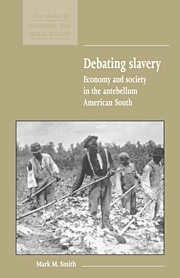Book contents
- Frontmatter
- Contents
- List of figures
- List of tables
- Preface
- 1 The contours of a debate
- 2 Slaveholders and plantations
- 3 Yeomen and non-slaveowners
- 4 Slaves
- 5 The profitability of slavery as a business
- 6 The Profitability of slavery as a system
- 7 New directions, toward consensus
- Bibliography
- Index
- Economic History Society
- New Studies in Economic and Social History
- Studies in Economic and Social History
4 - Slaves
Published online by Cambridge University Press: 05 June 2012
- Frontmatter
- Contents
- List of figures
- List of tables
- Preface
- 1 The contours of a debate
- 2 Slaveholders and plantations
- 3 Yeomen and non-slaveowners
- 4 Slaves
- 5 The profitability of slavery as a business
- 6 The Profitability of slavery as a system
- 7 New directions, toward consensus
- Bibliography
- Index
- Economic History Society
- New Studies in Economic and Social History
- Studies in Economic and Social History
Summary
Having considered the capitalist and non-capitalist characteristics of southern white society, we turn now to the black South. Themes examined in this chapter include the relationship between slave work and culture and the implications each had for retarding or promoting the development of the South's plantation economy. Although the relationship between slave culture and the character of the plantation economy has been implicit in much historical writing, this chapter seeks to link the two explicitly.
Work and culture
Contingent on the nature of slave labor was the essence of slave culture. Although historians continue to disagree on the origins of the task system, for example, most agree that it permitted a greater degree of slave autonomy than did the gang system (Littlefield, 1995). Employed throughout the South but primarily on the rice coasts of Georgia and South Carolina, the task system assigned specific tasks to specific workers. As Charles Joyner explains it: “Unlike the gang labor on cotton plantations, under the task system the owner or overseer assigned each slave a certain task each morning. When that job was finished, the slave was free to pursue personal interests. Tasks were calculated to last the whole day, but some slaves finished early” (Joyner, 1984, p. 43). Masters benefited from this system because they could attribute thorough or shoddy work to specific slaves and reward or punish accordingly.
- Type
- Chapter
- Information
- Debating SlaveryEconomy and Society in the Antebellum American South, pp. 42 - 59Publisher: Cambridge University PressPrint publication year: 1998



